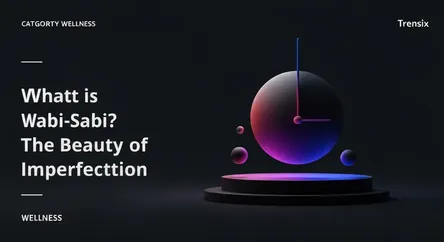Wellness
What is Wabi-Sabi? The Beauty of Imperfection

Discover wabi-sabi, the Japanese art of finding beauty in imperfection and transience, and learn how it can promote mindfulness and contentment.
What is it?
Wabi-sabi is a traditional Japanese worldview centered on the acceptance of transience and imperfection. It's an aesthetic philosophy that finds beauty in things described as "imperfect, impermanent, and incomplete." The concept combines two principles: "wabi," which relates to rustic simplicity and living in harmony with nature, and "sabi," which refers to the beauty that comes with age and wear. Rooted in Zen Buddhism, wabi-sabi appreciates asymmetry, roughness, simplicity, and natural objects. It is the opposite of Western ideals of perfection and monumental beauty.
Why is it trending?
In a world dominated by social media's curated perfection and constant consumerism, wabi-sabi offers a meaningful alternative. It is gaining popularity as a wellness trend because it provides an escape from the relentless pursuit of flawlessness, which often leads to stress and anxiety. This philosophy is increasingly influencing interior design, where it promotes calming, authentic spaces using natural materials and celebrating well-used items. As people seek more mindful and sustainable lifestyles, wabi-sabi's emphasis on appreciating what you have and finding beauty in the simple resonates deeply.
How does it affect people?
Adopting a wabi-sabi mindset can profoundly impact mental well-being. By fostering an acceptance of flaws, it helps reduce the pressure to be perfect, thereby alleviating stress and anxiety. It encourages people to practice gratitude for what they have rather than constantly wanting more. This can lead to a more content and authentic life. In practice, it might mean cherishing a chipped mug for its history, appreciating the signs of aging, or finding peace in a simple, uncluttered environment. Ultimately, wabi-sabi helps people live more mindfully and connect more deeply with their lives.